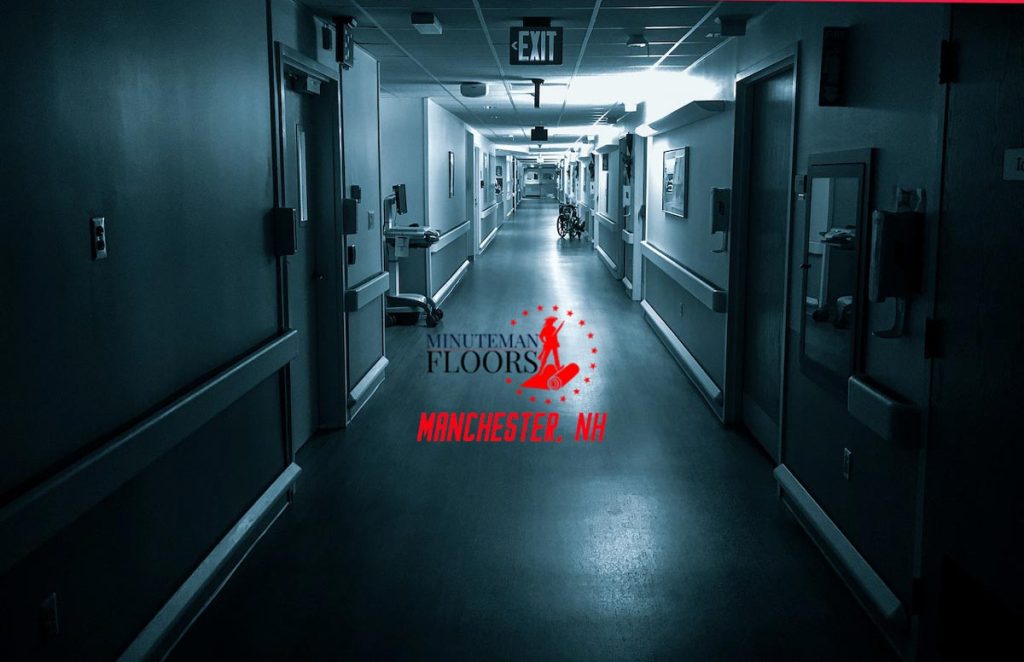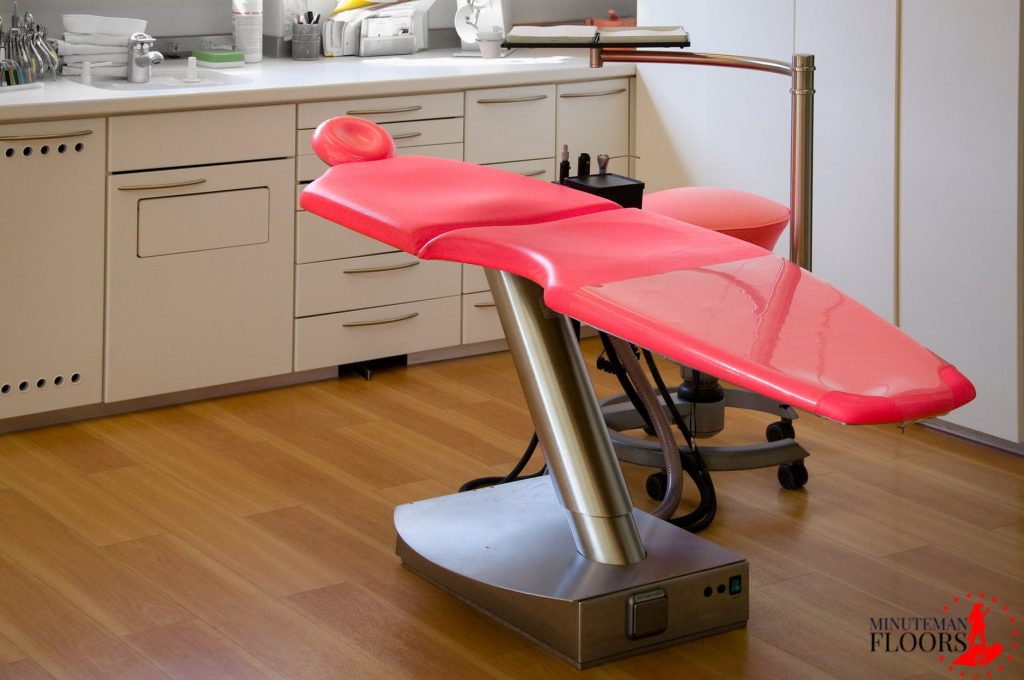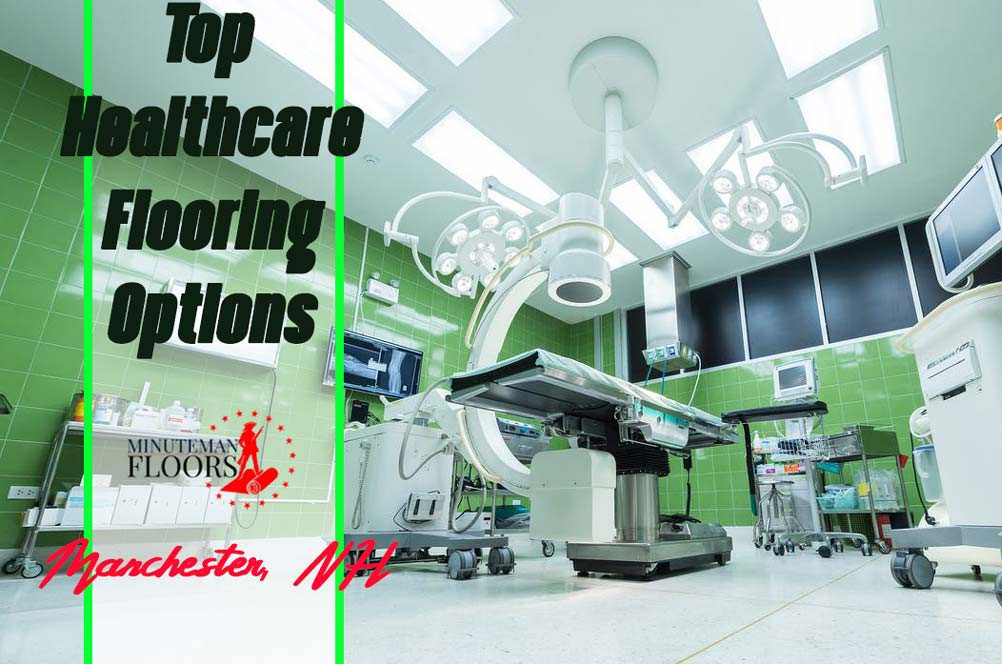When it comes to hospitals and other healthcare facilities, the floor plays an important role in the functionality and safety of the whole facility. Hospitals include various areas each of which has unique requirements and purposes. So, choosing the best hospital flooring options for different areas is a critical decision.
In this article, we’ll discuss the most important factors that must be considered before choosing hospital flooring. Then, we’ll go over the best flooring options available for different areas in hospitals, different kinds of clinics, surgery centers, health centers, rehabilitation centers, long-term care facilities, pharmacies, etc.
Do you have a big flooring project in Manchester, NH?
Minuteman Floors is the best option you’ve got in Manchester and its neighboring cities.
Call now to discuss your project.
Crucial Factors to Consider When Choosing Hospital Flooring Options

Healthcare facilities and hospitals are high-traffic places that must be comforting, safe, hygienic, and quiet. So, not any type of flooring is a good choice for such a place. There are various considerations to keep in mind.
Safety and Hygiene
Floors in healthcare facilities must be slip-resistant. A non-slip surface prevents accidents not just for the patients, but also for the staff who sometimes have to run to save precious time.
Also, it should be fire-resistant. Some flooring materials can burn easily and increase the risk of fire incidents. Also, in case of fire, these materials might emit harmful gases that worsen the situation and make the rescue even more difficult.
Another important factor is hygiene. The hospital is a sterile environment and the floor should be easy to clean and disinfect. There are also some flooring options, like antimicrobial vinyl, that resist bacterial and fungal growth.
Durability and Resilience
Healthcare facilities get a lot of foot traffic as well as impacts from instruments and equipment. So, to avoid frequent flooring repairs and replacements, it’s necessary to go with hospital flooring options that are wear and impact-resistant.
Also, as the floor needs to be disinfected frequently, especially in operating rooms, the flooring should be chemical-resistant.
Comfort and Acoustic Properties
Hospital staff has to be on their feet for hours. Flooring materials that provide cushioning and comfort (like rubber) can help reduce fatigue for the staff. Also, it can make the place more comfortable for the patients.
Another crucial matter in a healthcare facility is noise reduction. Hospitals are supposed to have a calming atmosphere, however, with too many people around, noises from medical equipment, stretchers and carts being pushed around, etc., it’s a bit difficult to achieve.
So, flooring materials with acoustic properties (like rubber) that can reduce noise and minimize disturbances should be prioritized over others.
Maintenance and Cleaning
Downtime is almost impossible for a hospital. So, before choosing a type of flooring for such places, we should keep in mind that it should be low-maintenance.
As mentioned before, hygiene is a priority in a healthcare facility. So, the floor should be easy to clean and disinfect.
Aesthetics and Environmental Factors
Aside from the functionality and safety matters, healthcare facilities should be a welcoming and calming environment with a pleasant look. This provides a more positive atmosphere for the patients and their families.
In addition, there are various areas and departments in such facilities. With the right flooring design, the color and pattern can separate different spaces and help people find their way to each area more easily.
What’s more, hospitals should have good indoor air quality. Therefore, eco-friendly flooring materials with low VOCs (Volatile Organic Compounds) are better choices both for the people and the environment.
Standards and Regulations
Last but definitely not least, hospital flooring options must meet local and federal health and safety codes as well as accessibility standards (ADA, Americans with Disabilities Act) for people with disabilities.
Overall, choosing a suitable flooring material for any part of a healthcare facility is an important task that affects not just functionality and safety, but also how visitors, patients, and staff feel and experience. So, it shouldn’t be taken lightly.
Newest and Best Hospital Flooring Options for Different Areas in a Hospital

Now, it’s time to explore the best hospital flooring options we have that meet the factors above based on the area.
Right Flooring for Hospital Entrance
A good hospital entrance flooring should be durable to withstand foot traffic, low-maintenance, hygienic, slip-resistant, and welcoming. Here are two of the best options we have.
- LVT (luxury vinyl tile): LVT is a highly durable flooring material that can handle heavy foot traffic, movements of wheelchairs, stretchers, etc. It’s also low-maintenance, easy to clean, and comes in different levels of slip resistance. Plus, it’s resistant to spills and stains. To provide a welcoming atmosphere, LVT offers various eye-catching colors and patterns you can choose from and ensure a good first impression.
- Porcelain tile: It’s another resilient and durable material that can handle heavy use in a hospital entrance. It’s low-maintenance, easy to clean, hygienic, and slip-resistant (depending on the texture and finish). Additionally, it’s available in different colors, textures, and patterns and gives the place a sophisticated and professional look.
Flooring for Reception and Waiting Rooms
The reception and waiting rooms should be comfortable, pleasant, and welcoming. These areas tend to be noisier, so noise reduction is another factor to take into account when choosing the right flooring material for the waiting rooms and reception areas in a hospital.
- Carpet tiles: This kind of carpet flooring consists of small tiles of carpets that can easily attach to each other without any glue. They can also be cut easily to ensure a wall-to-wall covering. Like other carpets, they offer warmth, comfort, acoustic properties, and a wide range of colors and patterns. Carpet tiles can be easily washed or replaced without the need for replacing the entire carpet. This makes them easy to maintain. Except for waiting rooms and reception areas, carpet tiles are suitable for staff lounges and offices in the hospital.
- LVT (with underlayment): This is another great option for these areas. Except for being comfortable, durable, and low maintenance, the variety of colors and designs that LVT offers has made customizing the flooring design easy. It also absorbs the sound and creates a quieter environment.
Corridors, Clinical Rooms, and Patient Rooms Flooring
Durability, hygiene, noise reduction, safety, and comfort should be prioritized when selecting flooring material for hospital hallways, patient rooms, and clinical rooms. Here are the best three options.
- Sheet vinyl and LVT: Both of these types of vinyl flooring offer durability, low maintenance, slip resistance, and hygiene. Sheet vinyl also provides a seamless surface that’s even easier to clean and disinfect. Thicker and denser sheet vinyl or LVT with an attached underlayment feels comfortable under the feet and reduces noise.
- Linoleum: Aside from its durability, ease of maintenance, hygiene, sound absorption, comfort, and safety, linoleum is an eco-friendly option made of natural materials, such as linseed oil, cork dust, wood flour, and minerals. These materials offer a natural antimicrobial property that enhances hygiene. Linoleum is more suitable for patient rooms.
- Rubber flooring: This is a flooring material with high longevity, durability, noise reduction properties, comfort, and slip resistance. It’s also easy to clean and maintain. Besides, rubber flooring is resistant to the growth of bacteria and fungi.
Best Flooring Materials for Operating Rooms and Surgical Suites

Strict hygiene is required in operating rooms and constant disinfection is necessary. So, aside from durability and slip-resistance, resisting chemicals and stains is an important feature of operating room flooring.
- Sheet vinyl: The seamless surface of a sheet vinyl floor doesn’t allow bacteria and fungi growth. It is also easier to clean and disinfect. Sheet vinyl can withstand chemicals and stains pretty well.
- Rubber flooring: This type of flooring is very comfortable and reduces fatigue for the staff. It’s also slip-resistant and doesn’t allow bacteria and fungi to grow.
Flooring in ICU and Emergency Rooms
Like operating rooms, ICU and emergency rooms are frequently disinfected. Except for sheet vinyl, epoxy flooring can be a good option for these areas. It offers the following benefits that have made epoxy flooring for healthcare facilities a popular option.
- Exceptional durability
- Seamless and non-porous surface
- Resistance to chemicals and stains
- Slip-resistance
- A wide variety of colors and patterns
Laboratories Flooring Options
Resistance to chemicals and slipping are the main factors for hospital laboratory flooring. Epoxy is usually the first choice for this area for the reasons discussed above. However, vinyl composition tile or VCT flooring is another option.
VCT is durable and cost-effective, but it’s not low-maintenance and needs regular waxing and polishing.
Flooring for Cafeterias and Dining Areas
These areas aren’t sanitized as often as ICU and operating rooms, but the floor needs to be durable, slip-resistant, stain-resistant, low-maintenance, easy to clean, and visually appealing.
So, LVT is one of the most commonly used materials for these areas. Another good option is quarry tiles. They’re unglazed ceramic tiles that are easy to clean, extremely durable, and slip-resistant. They’re also eco-friendly, cost-effective, and low-maintenance. Quarry tile flooring adds a natural earthy look to the place that creates a welcoming, rustic, and warm ambiance.
To sum up, each part of a hospital requires special specifications, so it’s not recommended to use the same type of flooring for all the areas. LVT, epoxy, sheet vinyl, and rubber flooring are the most common hospital flooring options these days that can ensure safety, functionality, and aesthetic appeal.
Call now to schedule a free visit by our flooring experts.
FAQs About Best Flooring Options for Healthcare Facilities and Hospitals
Here are some of the most common questions about healthcare flooring.
What Are Non-Porous Flooring Options for Clinics and Hospitals?
LVT, sheet vinyl, epoxy, rubber, and porcelain are all non-porous flooring materials that are commonly used as hospital and clinic flooring. They don’t allow moisture and liquid to penetrate and this makes them resistant to stains and water damage.
What Anti-Bacterial Flooring Materials Are Suitable for Surgery Rooms?
Sheet vinyl, rubber, and epoxy flooring offer anti-bacterial properties that prevent infections and bacterial growth.
What Type of Flooring Is Best for Hospital Restrooms?
Ceramic tile is a good choice for hospital restroom floors because it resists water and stains and lasts long. Ceramic is also easy to clean and maintain. Another option is sheet vinyl. It’s more affordable but offers durability, slip resistance, and a seamless surface that doesn’t allow water seepage.
Is Linoleum Still a Commonly Used Hospital Flooring Material?
Yes. Hospital-grade or commercial-grade linoleum is still a good choice for patient rooms and hallways. However, these days newer materials, like sheet vinyl and epoxy that provide seamless surfaces, are more popular.
Top-quality Flooring Services for Commercial and Residential Settings in Manchester, NH
We have discussed all the best hospital flooring options for each area separately. Although nowadays a lot of high-quality bio-resistant flooring materials are available, if they’re not installed and looked after properly, hospitals have to deal with constant repair and replacement.
Minuteman Floors offers vinyl flooring, epoxy flooring, and luxury vinyl for commercial spaces such as healthcare facilities. We offer a one-year warranty and promise a quick and professional installation to reduce downtime. Call 603-782-1942 to discuss your project and schedule a visit.

